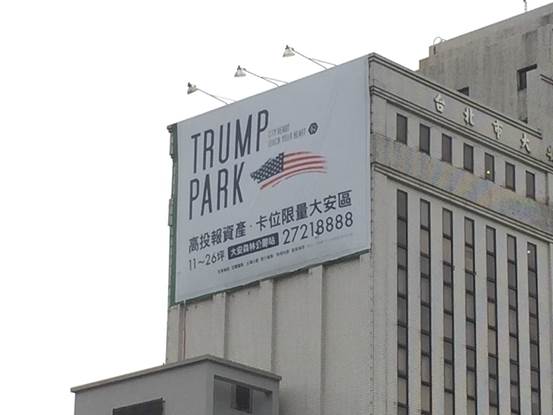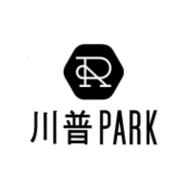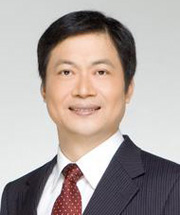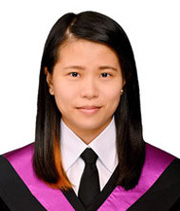
Figure 1: A billboard advertising the "Trump Park" development on a building in Taipei.
Source: Reddit thread: Trump Park? Worst name ever
The new US President, Donald Trump, is anything but low key, and with his penchant for dramatic rhetoric, he’s successfully captured the hearts of many voters. Even at the other side of the Pacific in Taiwan, developers have picked up on his popularity and have launched a NT$2 billion (US$64.3 million) development using the name “Trump Park”.
According to press reports, advertisements for Trump Park were first released in August 2015. As well as featuring the words “Trump Park”, the US flag also features on the billboard. Trump’s achievements are also listed on the first page of the development’s brochure. In small print at the bottom of the billboard (in Chinese) is written “Hung Poo Real Estate Development; ‘Taiwan Trump’ and ‘United Giants Estate”.
As the Trump Organization invests in real estate projects all around the world, this might lead certain Taiwanese people and even foreign travelers to falsely believe that this development project was launched by a Taiwanese developer in cooperation with the Trump Organization. The Trump Park development project has no connection to the US Trump Organization or to Donald Trump himself, however.
This kind of advertising strategy can confuse and mislead consumers to a greater or lesser extent; if the Trump Organization in the US caught wind of this kind of advertising strategy in Taiwan, not only would they be displeased, they would likely launch a cross-border lawsuit. This article sets out from the perspective of Taiwan’s Trademark Law to analyze several different scenarios and how they would play out.
Can Trump enforce a trademark or even apply for a trademark?
In this particular case we know from Taiwan Intellectual Property Office records that Trump had already protected his trademark in Taiwan before the Taiwanese developer attempted to trademark “Trump Park”. However, this may not always be the case for Western brands trying to enforce their trademarks in Taiwan, and we have addressed three issues that could arise for these brands:
Issue 1: The Taiwanese developer has not yet applied for a trademark for "Trump,” and the US Trump Organization wants to apply for a trademark in Taiwan for its goods or services in the construction category (including developments and infrastructure projects). Can they register it successfully?
Issue 2: Before the Trump Organization can apply for the "Trump" trademark, a Taiwanese developer registers the trademark with the Taiwan Intellectual Property Office first. Will the intellectual property office grant this trademark?
Issue 3: The Taiwanese developer uses the word "Trump" as its company's trademark and it has been granted. Can the Trump Organization still successfully enforce their trademark in Taiwan?
Are the two characters used in Taiwan[1] to render Donald Trump's surname in Chinese distinctive?
First of all, trademarks for goods or services are used to show the origin of a product or service, and it has to be able to distinguish it from other products or services provided by others, which is what is referred to in trademark theory as "distinctiveness". According to Taiwan's Trademark Law and the trademark regulations of other countries, when you register a trademark, you can't use the name or image of the founder or head of state, or other people's portrait or name.
Normally, the names of ordinary people aren’t distinctive. However, because Donald Trump, his real estate development businesses, hotels and entertainment business all use the name “Trump” for marketing products, buildings and other services, like Trump Tower for instance, this name is already distinct enough from other names and brands. It has been endowed with a “secondary meaning” and therefore is considered distinctive, just like, despite “McDonald’s”, “Ford” and “Disney” being the surnames of the founders of their respective companies, they are distinctive because most people think of the McDonald’s fast-food chain, rather than the founder, when they hear the term “McDonald’s”. According to trademark regulation, in principle, you shouldn't register the names of famous people; however, if you have the permission of the famous person, you can register it. In this situation, the US Trump Organization can apply for a trademark on the name in Taiwan if it gets permission to do so from Donald Trump, select the construction industry as their trademark category and get it granted.
Is "Trump" a well-known trademark?
Given that in this situation it was not Trump himself or a company that represents him, but rather a Taiwanese developer who wanted to register the Trump mark independently, this runs into the problem of using other people's famous trademarks. As, if the mark you wish to use is the same or similar to another famous mark, this can be considered likely to confuse or mislead the public and may damage the well-known trademark's distinctiveness or pose a threat to public confidence in the trademark and therefore can't be registered.
The Trademark Law has this regulation in place to strengthen protection of well-known trademarks, to maintain fair competition between businesses and just trading conditions. Well-known trademarks have a certain amount of profile in their relevant sector, which makes consumers think of the product or service's origin immediately upon hearing or seeing it, just as we are all familiar with famous brands. So, if "Trump" is a well-known brand among Taiwanese consumers, and a Taiwanese developer applying for the Trump trademark would lead to the public thinking mistakenly that the holder was working with the Trump Organization in the US, or even that the development project was launched by the US Trump Organization itself it could damage the distinctiveness of the US Trump Organization and consumer trust in their reputation, so the Taiwan developer should not have applied for the "Trump" trademark as its own mark (whether this constitutes trademark squatting is another matter that is not within the purview of this article).
If other parties had already applied for a similar trademark, could the Trump Organization enforce its rights in Taiwan?[2]
If the Taiwanese developer had already been successful in its registration before Donald Trump was able to register his mark in Taiwan, could the US Trump Organization enforce their trademark in Taiwan? According to the current trademark regime in Taiwan, the Trump Organization could lodge an objection with the Taiwan Intellectual Property Office up to three months after the trademark application was published, in an attempt to get the Taiwanese developer’s trademark revoked, and then they could apply for the mark themselves.
The reason trademark laws are designed as described above is because, otherwise, if a Taiwanese developer were allowed to use Trump's fame and the value of his hard-won brand and image, that would be taking advantage of a well-known trademark. This kind of behavior, known as "free riding", makes it hard for consumers to discern the difference between a genuine brand and imitators, leading to confusion which puts them in a position of disadvantage. Free-riding is not good for the development of the market in general, and in the end can mean that businesses may be unwilling to continue developing their brand and image. This is why the trademark legislation in many countries states that if a trademark is identical or similar to a well-known trademark belonging to someone else, to the extent that it could lead to the consumer being confused, mistaken or lead to damage to the well-known trademark in terms of its distinctiveness and reputation, it can be rejected or revoked. Within three months of a trademark registration being published, anyone can lodge an objection with the Trademark Office in order to have the registration revoked. In addition, the injured party (here the Trump Organization) can also apply for an evaluation of the trademark, within five years of the trademark being published, to get it revoked and then they can apply for the trademark themselves, to gain the formal rights to their mark.
What can Trump do about “Trump Park”?
This piece has already mentioned that Donald J. Trump applied for a trademark for the two Chinese characters that make up the translation for “Trump” in Chinese (in Taiwan) on October 9, 2008 and this was granted on March 16, 2010; whereas the Hung Poo Real Estate Development applied for a trademark on these two characters juxtaposed with the English word “PARK”, as in Figure 1 below, on February 26, 2016. The latter application was rejected by the Taiwan Intellectual Property Office on December 1, 2016 on the basis of Section 10 of Article 30 of the Trademark Law, which precludes registration of a trademark for “ being identical with or similar to another person’s registered trademark or earlier filed trademark and to be applied for goods or services identical with or similar to those for which the registered trademark is protected or the earlier filed trademark is designated, and hence there exists a likelihood of confusion for relevant consumers”.

Figure 2: The trademark applied for by Hung Poo Real Estate Development, combining the two Chinese characters used in Taiwan to translate "Trump” and the English word “PARK”.
Although the “Trump Park” trademark was designated for other fields[3] in addition to those of the “Trump” trademark, this does not mean that it does not infringe on the Trump trademark. Given that the two marks are similar in their pronunciation, appearance and concept, it is highly likely that consumers might mistakenly believe that Donald J. Trump is an investor in the development project, or mistakenly believe that Trump PARK was one of the luxury developments that have been launched by the Trump Organization around the world. In this way, in some intangible form, Trump is being used as a free advertisement for Trump PARK. To take it slightly further, even if Trump PARK had successfully registered its trademark with the Taiwan Intellectual Property Office, anyone has the right to oppose the trademark within three months of its publication, on the grounds that it is taking advantage of someone else’s work in building their brand.
Related Issues
As well as the problems using Trump’s name as a trademark for a development project can cause with regard to trademark law, this kind of “free-riding” or implied association can also violate Taiwan’s Fair Trade Act. In addition, if the Taiwan developer were to use Trump’s image, this could also constitute a violation of the use of someone else’s image without permission. The focus of this article is trademark law, however, so these other issues won’t be discussed here.
- Mainland China uses an alternative phonetic rendering of Trump’s name and hence his trademark.
- Many local media outlets have reported on the controversy surrounding Taiwanese development projects using the Chinese characters for "Trump". These media reports mistakenly lead the reader to believe that the Trump Organization has yet to apply for a trademark in Taiwan. However, the Trump Organization has already applied for a trademark on the two Chinese characters for "Trump" and this trademark was granted on March 16, 2010.
- The “Trump Park” trademark was filed in categories 36 (insurance, financial services, real estate, shopping centers), 37 (construction and infrastructure development) and 42 (architectural design, interior design, graphic design etc), whereas the “Trump” trademark was filed in categories 36, 37, 41 (education, sports, entertainment and leisure, including beauty pageants) and 43 (hospitality).
 |
|
| Author: |
Dr. Edward Yeh |
| Current Post: |
Attorney at Law, Yeh Law Group |
| Education: |
J.D. University of Texas at Austin;
LL.M University of Texas at Austin;
LL.M New York University |
| Experience: |
Associate Professor, School of Law, Temple University;
Consultant on Legislative Changes and Arbitration Committee Member, Taiwan Intellectual Property Office;
Visiting Scholar, University of London |
| Publications: |
Trade Secret Strategy: Practical Examples and Contract Templates (Chinese; Co-author) |
|
|
 |
|
| Author: |
Kate Tsai |
| Current Post: |
Post-graduate student, School of Law, National Taiwan University;
Assistant for the Yeh Law Group |
| Education: |
Bachelor degree, School of Law, National Taiwan University |
| Experience: |
Taiwanese Bar Exam (2016);
Editor, National Taiwan University Asian Center for WTO & International Health Law and Policy Journal |
|
|
|
| Facebook |
|
Follow the IP Observer on our FB Page |
|
|
|
|
|
|

